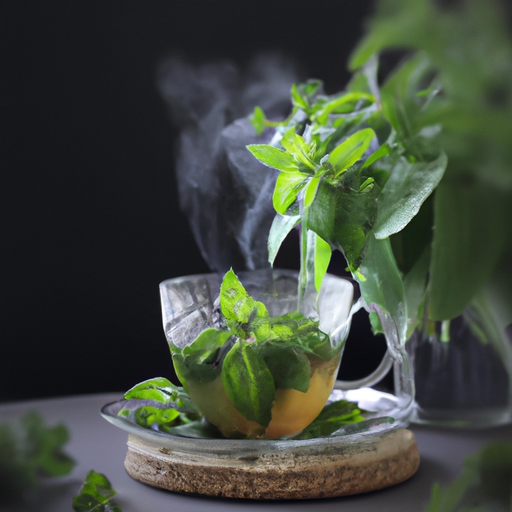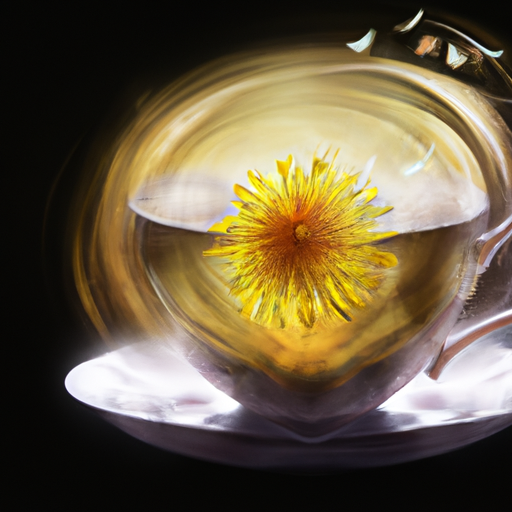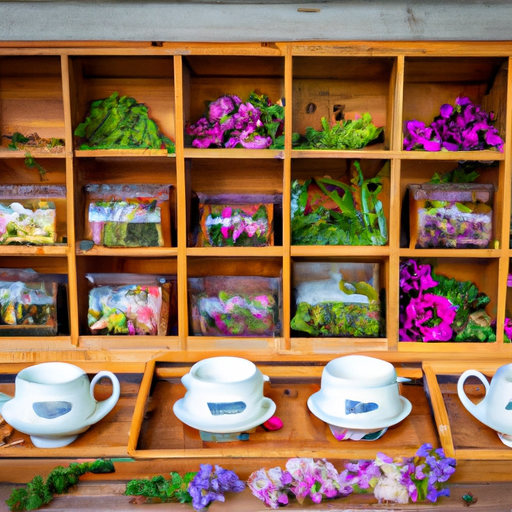Bloating, like a pesky cloud obscuring a sunny day, can cast a shadow on our lives. Whether it’s caused by indulging in a hearty meal or simply a result of our body’s natural processes, bloating can leave us feeling uncomfortable and sluggish.
Fortunately, nature has provided us with a remedy in the form of herbal teas. These delightful brews, infused with the healing power of plants, can help alleviate bloating and restore our sense of balance.
When it comes to herbal teas for bloating, there are a variety of options to choose from. Chamomile tea, with its soothing properties, can calm the digestive system and reduce bloating. Peppermint tea, known for its refreshing and cooling effect, can alleviate discomfort and promote healthy digestion. Ginger tea, with its zesty and invigorating flavor, can aid in digestion and relieve bloating.
Fennel tea, with its gentle licorice-like taste, can help relax the muscles in the gastrointestinal tract and reduce bloating. Dandelion tea, known for its detoxifying properties, can stimulate the liver and promote healthy digestion. Lemon balm tea, with its citrusy and calming aroma, can soothe the stomach and alleviate bloating. And lastly, green tea, with its antioxidant-rich compounds, can support digestion and reduce bloating.
So, whether you prefer the floral notes of chamomile or the invigorating kick of ginger, incorporating herbal teas into your routine can be a soothing and effective way to combat bloating. Sip on these natural elixirs and embrace the gentle relief they bring, as nature’s remedy works its magic on your belly.
Key Takeaways
- Chamomile tea can calm the digestive system and reduce bloating.
- Peppermint tea can alleviate discomfort and promote healthy digestion.
- Ginger tea aids in digestion and relieves bloating.
- Lemon balm tea soothes the stomach and alleviates bloating.
Chamomile Tea
Chamomile tea is a fantastic choice to soothe bloating and promote digestive comfort. Not only does it have a pleasant, floral taste, but it also offers a multitude of health benefits.
Chamomile tea contains compounds that have anti-inflammatory properties, which can help reduce bloating and ease stomach discomfort. Additionally, it has been used for centuries as a natural remedy for digestive issues such as indigestion and gas.
To brew the perfect cup of chamomile tea, start by bringing water to a boil. Once the water’s boiling, pour it over a chamomile tea bag or loose chamomile flowers in a teapot or mug. Let it steep for about 5 minutes to allow the flavors and healthful compounds to infuse into the water. If you prefer a stronger taste, you can steep it for a bit longer.
After steeping, remove the tea bag or strain out the loose flowers, and your cup of chamomile tea’s ready to enjoy.
Now, let’s move on to the next herbal tea that can help with bloating: peppermint tea.
Peppermint Tea
To alleviate your discomfort, you may find relief by incorporating peppermint tea into your daily routine. Peppermint is a popular herbal tea known for its soothing and calming effects on the digestive system. Here are three reasons why peppermint tea is beneficial for bloating:
-
Reduces gas: Peppermint tea has carminative properties, which means it helps to reduce gas and bloating in the stomach. It relaxes the muscles of the gastrointestinal tract, allowing trapped gas to be released more easily.
-
Relieves spasms: The menthol in peppermint tea acts as a natural muscle relaxant, helping to relieve spasms in the intestines and reducing cramping and discomfort associated with bloating.
-
Improves digestion: Peppermint tea can stimulate the flow of bile, a substance produced by the liver that aids in the digestion of fats. By improving digestion, peppermint tea can help prevent the buildup of gas and bloating.
While peppermint tea is generally safe for most people, it’s important to note that excessive consumption may cause side effects such as heartburn or allergic reactions. If you have gastroesophageal reflux disease (GERD), it’s best to consult your doctor before incorporating peppermint tea into your routine.
Transitioning into the subsequent section about ginger tea, another herbal tea that can help with bloating, let’s explore its unique benefits.
Ginger Tea
Ginger tea, with its aromatic and warming properties, is renowned for its ability to alleviate discomfort caused by bloating. The benefits of ginger tea for bloating are numerous and backed by scientific evidence.
Firstly, ginger has natural anti-inflammatory properties that can help reduce inflammation in the digestive system, which is often a contributing factor to bloating. Additionally, ginger stimulates the production of digestive enzymes, promoting better digestion and reducing the likelihood of bloating.
To make ginger tea, start by peeling and slicing a fresh ginger root. Then, boil water in a pot and add the ginger slices. Let it simmer for about 10 minutes to allow the flavors to infuse. Afterward, strain the tea and add a natural sweetener like honey if desired. It’s important to note that ginger tea should be consumed in moderation, as excessive consumption may lead to heartburn or interact with certain medications.
Transitioning into the subsequent section about fennel tea, another herbal tea that is beneficial for bloating, fennel tea offers its own unique set of properties to help alleviate discomfort.
Fennel Tea
Fennel tea, with its delicate aroma and soothing properties, provides a comforting solution for relieving discomfort in the digestive system. This herbal tea has been used for centuries to aid digestion and alleviate bloating. Fennel seeds contain compounds that have anti-inflammatory and carminative effects, which can help relax the muscles in the gastrointestinal tract and reduce gas.
One of the key benefits of fennel tea for digestion is its ability to regulate bowel movements. It acts as a mild laxative, promoting healthy digestion and preventing constipation. Additionally, fennel tea can help reduce bloating and abdominal cramps by relieving trapped gas and soothing the digestive system.
To prepare fennel tea at home, you can follow these simple steps:
- Boil a cup of water.
- Crush one teaspoon of fennel seeds using a mortar and pestle.
- Place the crushed seeds in a tea infuser or a teapot.
- Pour the boiling water over the fennel seeds.
- Let it steep for about 10 minutes.
- Remove the infuser or strain the tea to remove the seeds.
- Serve and enjoy!
Moving on to dandelion tea, this herbal remedy also offers various benefits for digestion and bloating.
Dandelion Tea
Dandelion tea, known for its distinct flavor and potential health benefits, has gained popularity as a digestive aid and may help improve liver function. Did you know that dandelion tea is rich in antioxidants, with studies showing that it may have 5 times more antioxidant activity than some fruits and vegetables?
Here are three benefits of dandelion tea and a simple guide on how to make it:
-
Digestive Health: Dandelion tea has been traditionally used to alleviate digestive issues such as bloating and constipation. It may help stimulate the production of digestive enzymes, promoting better digestion and reducing bloating.
-
Liver Support: The antioxidants present in dandelion tea, such as flavonoids and phenolic compounds, may help protect the liver from oxidative stress and improve its detoxification processes. This can contribute to a healthier liver and overall well-being.
-
Diuretic Properties: Dandelion tea has diuretic properties, which means it may increase urine production and help reduce water retention. This can be particularly beneficial for relieving bloating caused by excess fluid.
To make dandelion tea, simply steep dried dandelion leaves or tea bags in hot water for about 5-10 minutes. You can enjoy it as is or add a touch of honey or lemon for flavor.
Now, let’s delve into the next herbal tea, lemon balm tea, which has its own unique benefits.
Lemon Balm Tea
After discussing the benefits of dandelion tea for bloating, let’s now turn our attention to another herbal tea that can help alleviate this uncomfortable condition: lemon balm tea. Lemon balm, scientifically known as Melissa officinalis, has been used for centuries in traditional medicine due to its numerous health benefits. This aromatic herb is native to the Mediterranean region and is known for its soothing properties.
Lemon balm tea is commonly used to relieve digestive issues, including bloating. It can help relax the muscles in the digestive tract, reducing spasms and promoting smoother digestion. Additionally, lemon balm tea has been shown to have mild anti-inflammatory effects, which can further aid in reducing bloating and discomfort.
If you’re looking to incorporate lemon balm tea into your routine, there are various ways you can enjoy it. Here are three refreshing lemon balm tea recipes to try:
| Lemon Balm Tea Recipes |
|---|
| 1. Lemon Balm Iced Tea |
| 2. Lemon Balm Mint Tea |
| 3. Lemon Balm Ginger Tea |
These recipes not only provide a delicious way to consume lemon balm, but they also offer additional health benefits from the other ingredients.
Now that we’ve explored the uses and recipes of lemon balm tea, let’s move on to another herbal tea that can aid in bloating relief: green tea.
Green Tea
Green tea is a fantastic herbal tea that can provide numerous health benefits. It’s been known to boost metabolism and aid digestion, making it a great choice for those looking to support their weight loss goals. Additionally, green tea has been shown to reduce bloating and water retention, helping to alleviate discomfort and promote a healthy digestive system.
Boost metabolism and aid digestion
To improve your metabolism and aid digestion, try incorporating herbal teas such as chamomile or peppermint into your daily routine. These teas have natural properties that can help alleviate digestive issues and promote a healthy gut. Chamomile tea is known for its calming effects on the digestive system, reducing inflammation and soothing stomach discomfort. Peppermint tea, on the other hand, has been shown to relax the muscles of the gastrointestinal tract, relieving symptoms of bloating and indigestion.
To understand the connection between metabolism and gut health, let’s take a look at the table below:
| Metabolism Boosting Teas | Digestion Aiding Teas |
|---|---|
| Green Tea | Chamomile |
| Oolong Tea | Peppermint |
| Ginseng Tea | Ginger |
| Yerba Mate | Fennel |
By incorporating these herbal teas into your routine, you can boost your metabolism and aid digestion naturally. Now, let’s move on to the next section where we will discuss how herbal teas can help reduce bloating and water retention.
Reduce bloating and water retention
Now let’s talk about reducing bloating and water retention, which are common issues that many of us face. When it comes to finding natural remedies for bloating and water retention, herbal teas can be quite effective. They offer a gentle and soothing solution to these problems without any harsh side effects.
So, what kind of herbal tea is good for bloating? Here are some options:
-
Peppermint tea: Known for its calming properties, peppermint tea can help relax the muscles in your gastrointestinal tract, reducing bloating and discomfort.
-
Ginger tea: Ginger has been used for centuries to aid digestion and reduce inflammation. It can help alleviate bloating by improving digestion and soothing the digestive system.
-
Chamomile tea: Chamomile has anti-inflammatory properties that can help reduce bloating and water retention. It also has a calming effect on the body, which can help ease digestive discomfort.
-
Dandelion tea: Dandelion acts as a natural diuretic, promoting urine production and reducing water retention. It is also known for its detoxifying properties, which can help alleviate bloating.
In addition to incorporating herbal teas into your routine, there are a few tips you can follow to prevent bloating and reduce water retention. Stay hydrated, avoid carbonated drinks, eat smaller meals, chew your food thoroughly, and limit your intake of salt and processed foods. By making these lifestyle changes and incorporating herbal teas, you can effectively reduce bloating and water retention naturally.
Frequently Asked Questions
Can I drink chamomile tea if I’m allergic to daisies?
If you’re allergic to daisies, it’s best to avoid chamomile tea. However, there are alternative herbal teas like peppermint or ginger that can help with bloating. Chamomile tea may cause allergic reactions in some individuals.
Is it safe to consume peppermint tea during pregnancy?
During pregnancy, it is generally safe to consume peppermint tea in moderate amounts. However, it is important to take safety precautions and be aware of potential side effects such as heartburn, acid reflux, and reduced iron absorption.
Can ginger tea help with motion sickness?
When it comes to motion sickness, ginger tea is a great option. Its natural anti-inflammatory properties can help alleviate nausea and dizziness. Try these ginger tea recipes for relief on your next journey.
How often should I drink fennel tea to relieve bloating?
To relieve bloating, I would drink fennel tea regularly. Research suggests that drinking fennel tea can help reduce bloating and improve digestion. Incorporating fennel tea into your routine can provide significant benefits for bloating.
Is there any caffeine in lemon balm tea?
Lemon balm tea typically contains a small amount of caffeine. It has several health benefits, including stress relief. However, excessive consumption may lead to side effects like nausea and headache.
Conclusion
After exploring various herbal tea options, it’s clear that there are several excellent choices for relieving bloating.
- Chamomile tea, with its soothing properties, can provide relief and promote digestion.
- Peppermint tea is known for its ability to relax the muscles of the gastrointestinal tract, reducing bloating and discomfort.
- Ginger tea can also be effective in reducing bloating and improving digestion.
- Fennel tea is another great option, as it helps to alleviate gas and bloating.
- Dandelion tea acts as a natural diuretic, aiding in water retention and reducing bloating.
- Lastly, lemon balm tea can help to calm the digestive system and alleviate bloating.
Green tea, while not specifically targeted towards bloating, can still be beneficial due to its antioxidant properties.
In conclusion, these herbal teas are fantastic natural remedies for bloating, and incorporating them into your daily routine can lead to a happier and more comfortable digestive system. So, grab a cup of tea and say goodbye to bloating!










